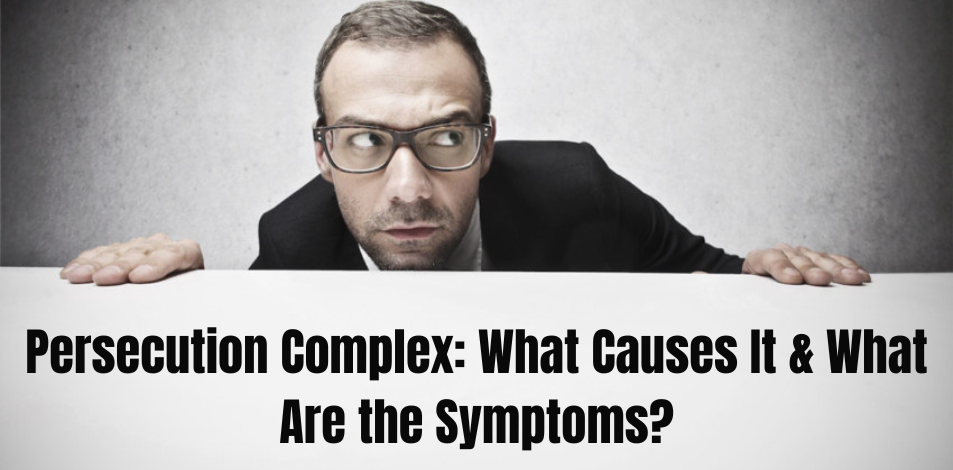
Do you sometimes feel like everyone is against you? That the world is in for you? Or are people out to get you? You may be suffering from a persecution complex.
These statements may seem pretty outrageous, and to most of us they are. However, did you know that according to research, at least 10 to 15% of us regularly suffer from these types of delusions?
Of course, we all have paranoid thoughts and feelings of persecution at times. It’s easy to blame outside forces when things don’t go our way. But for some people, it is a pervasive way of thinking that severely disrupts their lives.
So what exactly is this complex?
What is the persecution complex?
This complex arises when a person mistakenly believes that someone wants to harm him. The intensity and duration of these feelings can vary, as with the subject of paranoia.
For example, an employee may believe that all the office staff are against her and are intentionally undermining her chances for promotion. Or the individual may believe that he or she is being persecuted by government agents trying to frame him for crimes he did not commit.
Examples of persecution contract:
My husband is trying to poison me because he has a new girlfriend and wants me out of the way.
I know the police are spying on my phones.
I have to go to the self-service centers because the store assistants were told not to serve me.
My neighbors steal my laundry off the line while I’m at work.
In all examples, sufferers believe that a person, group of people, or organization will cause them harm.
People with a persecution complex usually speak in ambiguous terms. They’ll say “they’re out to get me” or “someone is listening to my calls.” However, when pressed further, they are unable to identify the culprit.
So where does this delusion come from and who is likely to suffer from it?
Where does the persecution complex come from?
Sufferers share three common aspects in the way they think, feel, and act. To understand this complexity further, we need to examine three key human behavioral processes:
Emotional processing
Abnormal internal events
Logical biases
- Emotional processing
Studies show that those with this complex tend to think more emotionally when it comes to their social experiences. They view their interactions with others through an emotional lens, rather than a logical lens.
As a result, patients are disturbed by everyday events and react more impulsively. However, the main problem when looking at everyday events through an emotional lens is that the sufferer will attribute greater meaning to the non-events.
- Abnormal internal events
Emotional processing is just one aspect of the oppression complex. The second is that sufferers misunderstand what is happening to them externally in the environment.
In order to be able to justify what is going on in their heads, they will focus on something outside of themselves. For example, a person with anxiety may attribute their anxious state to their belief that they are being watched.
Or a person who has recently become ill may believe they are slowly being poisoned. In all cases, they attribute their internal thoughts to external events.
- Logical biases
Studies have found that oppression complexes are perpetuated by cognitive biases. In other words, sufferers are more likely to use biases when they think. For example, jumping to conclusions, thinking in black and white and blaming others rather than themselves.
For example, a person who jumps to conclusions might view a black car driving up and down the road as a government spy. Those with normal thinking may assume that the driver is lost.
Who is most likely to suffer?
In addition to the three common features mentioned above, there are other commonalities that sufferers may share.
Childhood Trauma – Psychosis and paranoia can be linked to neglect, abuse, and childhood trauma.
Genetics – Delusional thinking is more common in those who already have a family member with psychosis such as schizophrenia.
Low Self-Worth – People who have a low sense of self-worth, are vulnerable to criticism and have low self-esteem are more likely to succumb to paranoid delusions.
Being overly critical of themselves – Research has shown that those who are overly critical of themselves can suffer from a persecution complex.
Anxious people – Those with a persecution complex have a tendency to worry and think more than the average person. They will also catastrophize and fantasize about implausible outcomes.
Hypersensitivity – People with paranoid delusions may seem overly sensitive to criticism from others. They are likely to view the lighthearted comment as a personal attack on them.
Treatment of persecution complex
Treatment for this delusion varies according to the prevailing symptoms and underlying causes.
For example:
Learning to control the underlying anxiety can reduce feelings of persecution.
Recognizing one’s thinking patterns, such as catastrophic thinking and black-and-white thinking, can increase feelings of paranoia.
Learning how to reduce the time you spend worrying will reduce the likelihood of developing paranoia.
Addressing past traumas from childhood can lead to a significant reduction in symptoms.
Cognitive behavioral therapy can help patients reduce their negative thought patterns.




